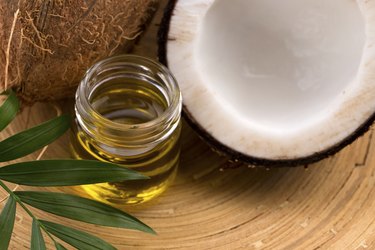
Tropical oils, such as palm and coconut oils, come from plants but have a very different nutritional profile from other plant-based fats. Palm oil is pressed from the flesh and kernel of the palm oil tree fruit and is produced at a rate of 47 million tons per year. Coconut oil comes from the white meat -- or copra -- of the brown-husked coconut fruit. Unlike other oils, tropical oils are semisolid at room temperature, which makes them suitable replacements for butter, margarine and shortening.
Counting Calories
Video of the Day
Like all fats, palm and coconut have a high energy content. One tablespoon of palm oil has 120 calories, while the same serving of coconut oil has 117 calories. Both types of oil have 13.6 grams of fat per tablespoon and no protein or carbohydrates.
Video of the Day
Fat Content
The saturated fat content in tropical oils is extremely high. NYU Langone Medical Center estimates that coconut oil contains more than 90 percent saturated fat and palm oil has a roughly one-to-one ratio of saturated and unsaturated fats. The American Heart Association recommends minimizing saturated fat consumption because of links to high cholesterol and an increased risk of cardiovascular disease.
Micronutrients
Palm oil is a good source of vitamins E -- a fat-soluble antioxidant that protects other vitamins, red blood cells and adipose tissue from damage. One tablespoon of palm oil contains 2.17 milligrams of a form of vitamin E called alpha-tocopherol -- a substantial amount considering the recommended daily allowance is only 15 micrograms. Coconut oil has a mere 0.01 milligrams of vitamin E per tablespoon, and both oils contain only trace amounts of other micronutrients. Neither oil contains sodium.
Better Options
While tropical oils are OK for occasional use, far healthier oils are available for baking and cooking. Replace palm and coconut oil with polyunsaturated fats, including corn, soybean, safflower, sunflower and cottonseed oils, and monounsaturated fats, such as olive, canola or sesame oil. Avoid any fat with the label "partially hydrogenated." Hydrogenated oils contain trans fats, which may raise your blood cholesterol, according to the University of Illinois.
- Green Palm: What Is Palm Oil?
- Tropical Traditions: What Is Virgin Coconut Oil?
- USDA National Nutrient Database: Oil, Palm
- USDA National Nutrient Database: Oil, Coconut
- NYU Langone Medical Center: Tropical Oils
- American Heart Association: Saturated Fats
- University of Illinois: Eating for Cardiovascular Health
- Colorado State University Extension: Fat-Soluble Vitamins: A, D, E, and K